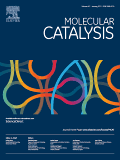
Molecular Catalysis
metrics 2024
Transforming Challenges into Catalytic Solutions
Introduction
Molecular Catalysis, published by Elsevier in Netherlands, is a premier academic journal that explores the cutting-edge domain of catalytic science. With an impressive impact factor and classified in the top quartiles (Q2) in various fields such as Catalysis, Physical and Theoretical Chemistry, and Process Chemistry and Technology, this journal stands as a significant resource for researchers and professionals committed to advancing the understanding of catalysis processes. Since its inception in 2017, it has been pivotal in publishing high-quality, peer-reviewed research that addresses crucial challenges and innovations in molecular catalysis. The journal is fully Open Access, allowing unrestricted access to its articles, thus fostering a wider dissemination of knowledge. Recognized for its rigorous editorial standards, it features works that push the boundaries of current scientific understanding, making it an essential platform for students and academics alike to share and grow in their expertise.
Metrics 2024
 0.72
0.72 3.90
3.90 3.80
3.80 175
175Metrics History
Rank 2024
Scopus
IF (Web Of Science)
JCI (Web Of Science)
Quartile History
Similar Journals

TOPICS IN CATALYSIS
Advancing Catalytic Innovation for a Sustainable FutureTOPICS IN CATALYSIS is a renowned journal published by SPRINGER/PLENUM PUBLISHERS, dedicated to advancing the field of catalysis and its applications in chemistry and chemical engineering. With its ISSN 1022-5528 and E-ISSN 1572-9028, this journal has been a critical resource since its inception in 1994, encompassing a wide range of research topics and recent advancements within the realm of catalysis, including both fundamental studies and practical applications. As of 2023, it holds a prestigious Q3 ranking in Catalysis and a Q2 ranking in miscellaneous chemistry, reflecting its impact and relevance in the academic community. With a Scopus rank of #128 in General Chemistry and #38 in Catalysis, TOPICS IN CATALYSIS is positioned to be a key contributor to the ongoing dialogue in these fields, fostering innovation and collaboration. While not an open-access journal, it provides institutional access options, ensuring that the latest findings and methodologies are available to researchers, professionals, and students worldwide. This journal is essential for those looking to stay at the forefront of catalysis research and its transformative potential in science and industry.
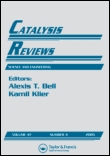
CATALYSIS REVIEWS-SCIENCE AND ENGINEERING
Pioneering Research and Insights in CatalysisCATALYSIS REVIEWS - SCIENCE AND ENGINEERING, published by Taylor & Francis Inc, is a leading journal in the field of catalysis, providing a vital platform for the dissemination of rigorous research and comprehensive reviews from 1968 to the present. With an impressive Q1 ranking in multiple categories, including Catalysis and Chemistry, this journal stands out as an essential resource for professionals, researchers, and students alike. Its high impact factor and esteemed Scopus ranks — including 3rd in Chemical Engineering: Process Chemistry and Technology — highlight the journal's influence and prestige within the scientific community. While primarily a subscription-based publication, the journal’s commitment to advancing the understanding of catalytic processes continues to foster innovation in various industrial applications, making it indispensable for anyone engaged in the fields of chemical engineering and applied chemistry.

Catalysis in Industry
Bridging academia and industry through catalytic excellence.Catalysis in Industry, published by MAIK NAUKA-INTERPERIODICA, is a pivotal journal in the field of chemical engineering and catalysis. With its ISSN 2070-0504 and E-ISSN 2070-0555, this journal has been dedicated to advancing the understanding and application of catalytic processes in industrial settings since its inception in 2010. Despite its Q4 ranking in the category of Catalysis as of 2023 and a Scopus rank of #61/68, the journal serves as a valuable platform for researchers and practitioners to disseminate innovative ideas and findings that contribute to the evolution of catalysis technology. Published in Russia, Catalysis in Industry aims to bridge the gap between academic research and industrial practice, providing Open Access options to facilitate widespread accessibility and encourage a collaborative approach to chemical engineering challenges. As the industry grapples with the demand for sustainable solutions and efficient processes, this journal remains a critical resource for the academic community, aspiring professionals, and students eager to deepen their knowledge in catalytic applications.
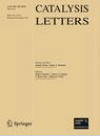
CATALYSIS LETTERS
Pioneering Insights in Catalytic ScienceCATALYSIS LETTERS, published by Springer, is a distinguished journal dedicated to presenting original research and review articles in the field of catalysis and its various applications. Serving the scientific community since 1988, this journal has continuously evolved, providing a platform for the dissemination of innovative findings that advance the understanding and development of catalytic processes. With an esteemed Q3 ranking in Catalysis and a Q2 ranking in miscellaneous Chemistry for 2023, CATALYSIS LETTERS underscores its relevance and impact within these critical fields. Although it does not offer open access, the journal remains a crucial resource for researchers, professionals, and students seeking to stay updated on contemporary advancements and discussions in catalysis. Its Scopus rankings further affirm its contribution to general chemistry and chemical engineering, making it an essential publication for those immersed in this dynamic area of study.
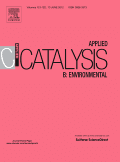
Applied Catalysis B-Environment and Energy
Empowering researchers to shape a cleaner, energy-efficient world.Applied Catalysis B-Environment and Energy, published by Elsevier, is a leading journal in the fields of catalysis, environmental science, and process chemistry, with an impressive impact factor that reflects its significance in advancing research and innovation. Established in 1992, this esteemed journal has earned a prestigious status as evidenced by its 2023 category quartiles—ranking in the Q1 category for Catalysis, Environmental Science, and Process Chemistry and Technology. With consistently high rankings in the Scopus database, it holds a remarkable position as #1 in General Environmental Science and #2 in both Process Chemistry and Catalysis, showcasing its profound impact on the respective fields. The journal’s scope encompasses both theoretical and practical research, targeting the pivotal developments in catalysis that promote sustainable practices and energy efficiency. Researchers, professionals, and students alike will find invaluable insights and cutting-edge studies published within its pages, making it an essential resource for those invested in pioneering advancements for a greener, more energy-efficient future.

Reaction Kinetics Mechanisms and Catalysis
Diving Deep into the Science of CatalysisReaction Kinetics Mechanisms and Catalysis is an esteemed academic journal published by SPRINGER, specializing in the fields of catalysis and physical and theoretical chemistry. With ISSN 1878-5190 and E-ISSN 1878-5204, this journal serves as a crucial platform for researchers and professionals to disseminate and engage with cutting-edge findings in reaction kinetics, catalytic processes, and mechanistic insights. Operating under an open access model, the journal ensures broad accessibility to its content, enhancing its impact within the scientific community. As of 2023, it is positioned in the Q4 category in catalysis and Q3 in physical and theoretical chemistry, reflecting its growing influence, yet also its potential for further advancement. Aiming to foster collaborations and innovations, Reaction Kinetics Mechanisms and Catalysis is poised to continue shaping the discourse in its field, making it an essential read for researchers, students, and industry professionals alike.
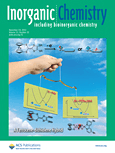
INORGANIC CHEMISTRY
Advancing the Frontiers of Inorganic ChemistryInorganic Chemistry, published by the American Chemical Society, stands at the forefront of the field of inorganic and physical chemistry, boasting an impressive impact in the academic community with a 2023 classification in the Q1 quartile across multiple categories including Inorganic Chemistry and Miscellaneous Chemistry. Since its inception in 1962, this esteemed journal has been a crucial platform for disseminating groundbreaking research, innovative methodologies, and comprehensive reviews integral to understanding the complex behaviors of inorganic materials. With a ranking of #12 out of 79 in Inorganic Chemistry and #37 out of 189 in Physical and Theoretical Chemistry according to Scopus metrics, Inorganic Chemistry has established itself as a premier destination for researchers, professionals, and students alike, eager to stay abreast of pivotal developments and trends in the discipline. Despite being a subscription-based journal, its esteemed reputation and critical contributions make it essential for anyone engaged in the exploration of inorganic chemical phenomena. As it prepares to converge into a new era by 2024, the journal continues to embody excellence and innovation, fostering a dynamic exchange of ideas essential for advancing this vibrant area of science.

KINETICS AND CATALYSIS
Elevating the Standards of Catalytic ResearchKinetics and Catalysis is a pioneering journal dedicated to advancing the field of catalytic science and chemical kinetics, published by Pleiades Publishing Inc. Based in the Russian Federation, this journal serves as a critical platform for disseminating high-quality research related to the mechanisms of chemical reactions and innovative catalytic processes. Although currently not an open access journal, it maintains academic rigor through a comprehensive peer-review process that ensures the relevance and integrity of its published works. With a history dating back to 1968, Kinetics and Catalysis has evolved through various converged years, reflecting its commitment to interdisciplinary research within the realms of chemistry, catalysis, and the computational aspects of modeling and simulation. As evidenced by its Scopus rankings and quartiles, it stands as an influential, albeit niche, journal, appealing to researchers, professionals, and students eager to explore the intricacies of chemical transformations. The journal’s robust archive offers an invaluable resource for those seeking to expand their understanding of both theoretical and practical approaches to catalysis.
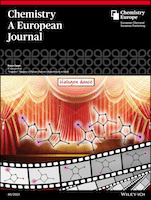
CHEMISTRY-A EUROPEAN JOURNAL
Advancing the Frontiers of Chemical ResearchCHEMISTRY-A EUROPEAN JOURNAL is a premier academic journal published by WILEY-V C H VERLAG GMBH, specializing in the diverse fields of chemistry and catalysis, with a distinguished focus on organic chemistry. Since its inception in 1995, the journal has established itself as an authoritative resource for researchers and professionals, currently classified in Q1 in Chemistry (miscellaneous) and Organic Chemistry, reflecting its high-quality contributions to the scientific community. With an impressive impact factor and robust Scopus rankings—#33 in Organic Chemistry and #26 in Catalysis—this journal serves as a vital platform for disseminating innovative research findings and critical advancements in chemical sciences. Although not an open-access journal, it provides valuable access options for institutions, ensuring wide reach and engagement within the scientific community. As it converges into 2024, CHEMISTRY-A EUROPEAN JOURNAL remains a key resource for anyone dedicated to advancing the frontiers of chemistry research.
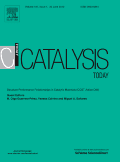
CATALYSIS TODAY
Igniting Innovation in Chemical EngineeringCATALYSIS TODAY is an esteemed journal published by Elsevier, specializing in the vibrant field of catalysis and its applications in chemical engineering. With the ISSN 0920-5861 and E-ISSN 1873-4308, it has continually contributed valuable research since its inception in 1987 and is set to maintain its influence through 2025. Hailing from the Netherlands, this journal stands out with a notable Q2 quartile ranking in catalysis and a Q1 ranking in miscellaneous chemistry as of 2023, reflecting its rigorous selection of impactful and innovative studies. Its Scopus rankings further substantiate its excellence, highlighting its position in the 89th percentile of general chemistry and 77th percentile in catalysis. CATALYSIS TODAY aims to disseminate cutting-edge findings, fostering exchange among researchers, professionals, and students in the catalysis community. By presenting high-quality research articles, reviews, and case studies, it plays a pivotal role in advancing knowledge and sparking discussions that drive future developments in the field.